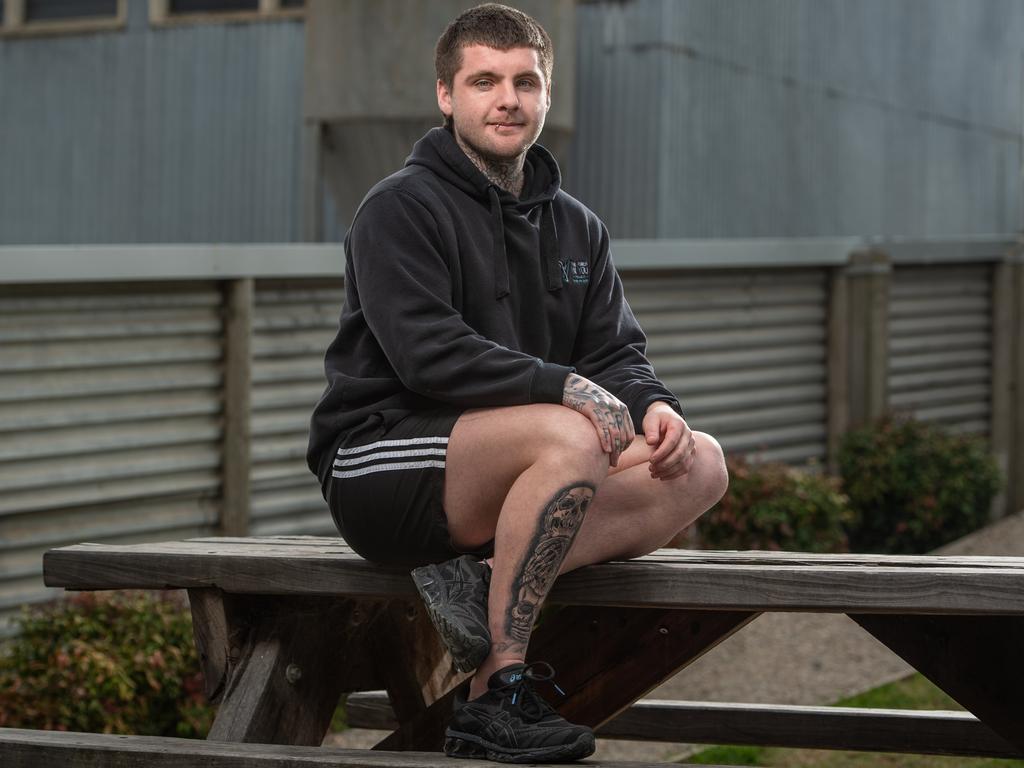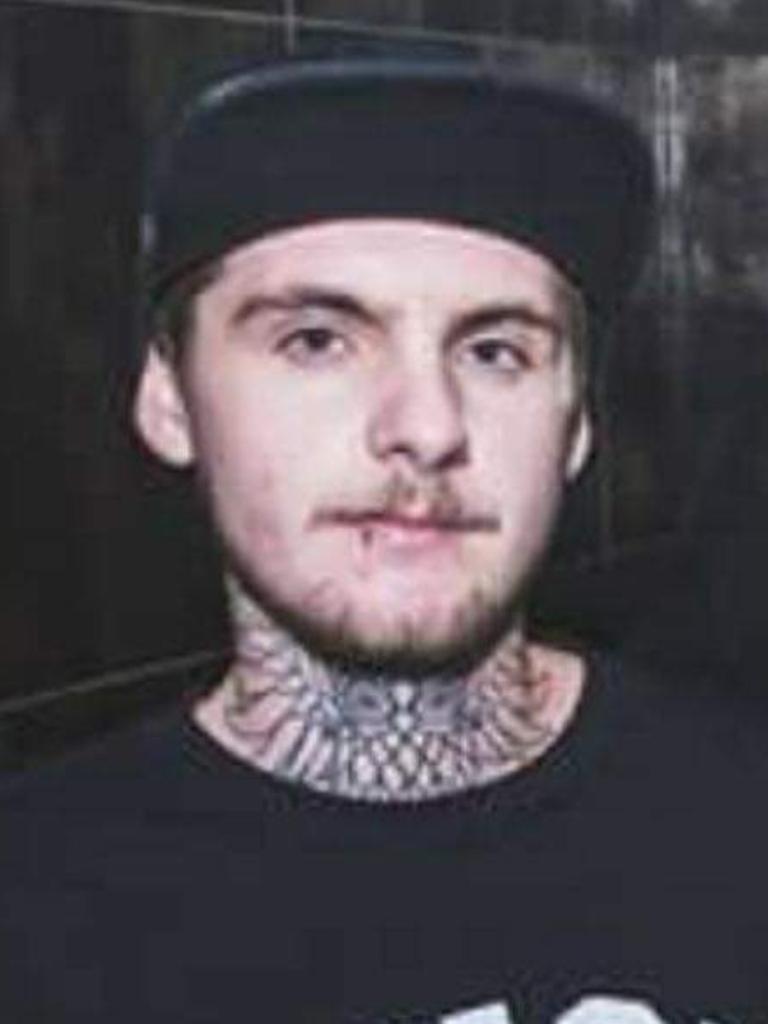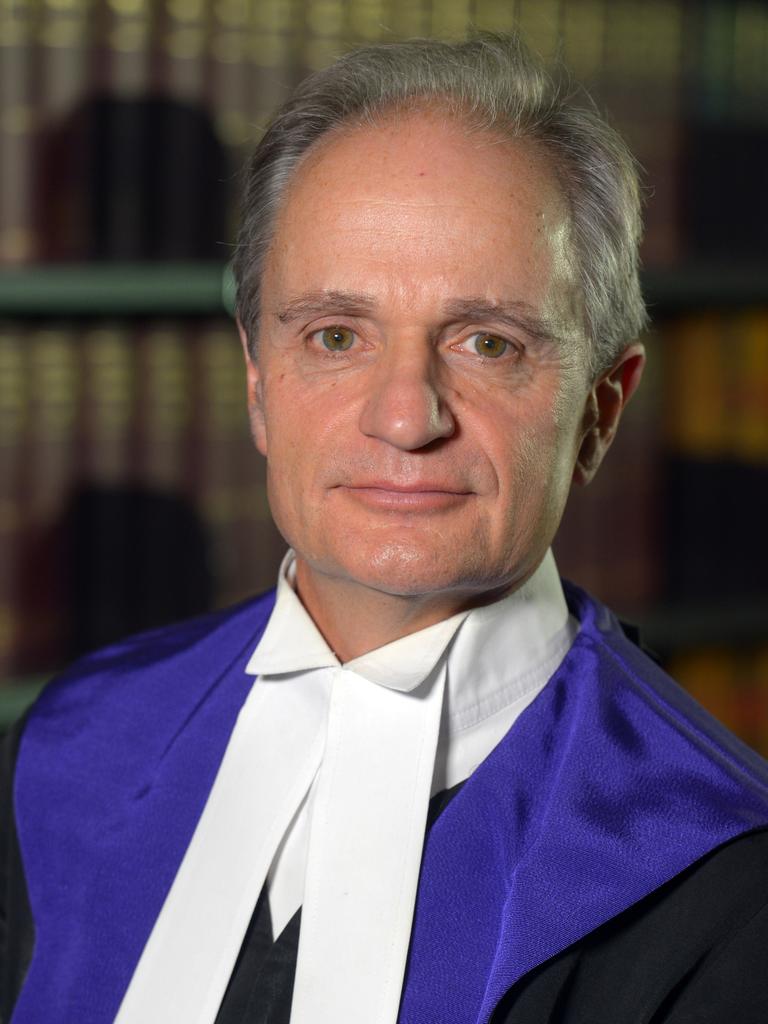Riley Rossiter turns his life around after serious assault
Once labelled a “thug”, Riley Rossiter has taken significant steps to change his life after spending nearly three years in jail. He’s now determined to help others.

Geelong
Don't miss out on the headlines from Geelong. Followed categories will be added to My News.
Four minutes of fury drastically shifted the course of Riley Rossiter’s life but he’s determined not to be defined by it.
At the end of Riley’s foot, and his mates’ fists, was the type of senseless alcohol-fuelled violence that makes seasoned court observers squirm, and demands judges jail offenders.
In Riley’s case, the victim’s shattered skull needed screws and surgery to fix; both his eye sockets and cheek bones were fractured.

The attack left the victim concussed, with two black eyes and life-long consequences.
Riley, now 24, was 19-years-old during the pack attack on May 20, 2018 at the Sporting Globe in Geelong.
Now he realises it was a flashpoint that showed his life had spiralled out of control after the death of his father when he was 16-years-old.
“Once I turned 18 I was exposed to the party life; the alcohol and drugs.
“I was using (drugs) pretty much Thursday to Sunday; a cocktail of anything I could get my hands on really. That was my way of coping.”
At the time of the attack Riley was so drunk, after it he couldn’t recall details about it.
But there’s a redemption story to tell here; one which Riley hopes by sharing can bring other lives back from the brink.
After almost three years in jail and 15 months on the outside, Riley’s outlook on life seems a mature one.

“The person that I was, I definitely don’t know that person anymore.
“My whole identity has changed. I have purpose. I am driven. I want to help.
“If I stop one little me before they get to prison, I’ve done my job. That’s something that I want to do.”
The Geelong Advertiser is telling this story to show how jail, and Riley’s motivation for change, has allowed him to take significant steps to again alter the course of his life.
Riley’s redemption story must in no way diminish the impact of his role in what was a sickening, three-on-one attack.
It was cowardly. It was brutal. All three attackers were jailed.
An experienced psychologist who assessed Riley before he was jailed, said he felt
“regret, guilt and remorse” for his actions.
His actions as a directionless 19-year-old during the four minutes of fury has, and will continue to have, life-altering consequences.
But the moments of mayhem are a reference point in his life which measure how far he has come.
IN JAIL FOR THE FIRST TIME
Riley’s first months in jail were a relief for his family. They feared if he stayed on the outside, and continued on the path he was on, he would end up dead.
But from those low moments have sprung the green shoots of a new life.
It started in the prison gym where the physical spilled over into wanting to change emotionally.
“I jumped in the gym for the first time and I thought ‘f--k this feels great’,” Riley says.
“I started seeing change in myself physically, then mentally I was like ‘alright with what I’ve changed now how can I create more change’.
“(At that time) I personally didn’t know my triggers. I didn’t know my underlying issues, or I didn’t know what grief was like.
“I just knew that I lost my father. I didn’t associate the feeling or emotions of it.
“I did 52 (counselling) sessions over a year.
“It was drug and alcohol counselling but it also went into the mental health side as well. “That’s what created the change.”

In jail, Riley completed courses and became a peer listener to help inmates.
“I’d help people with intellectual disabilities; I would help them write letters or I would help them fill out forms. That’s what created my purpose.”
Former Corrections Victoria Vocation Services Manager, Rodney Whittle, who worked in the field for a decade and observed Riley in jail, says he was “one out of the box”.
“Riley is one out of the box. When you find someone in prison like this, you know from the way they hold themself they’re on the right track,” Rodney says.
“I think it is important for young offenders, in particular, to break the cycle because the statistics show that if they don’t, it’ll be a vortex of reoffending, and 20 years go by and they’re in and out of jail.”
While in jail, Riley says Community based Counsellor Jaxsyn Scholes, Power In You
Project (PIYP) founder Kane Nuttall and Geelong Community Foundation Director Carly Luke all showed interest in his rehabilitation.
“I used to say to myself and to my psychologist at the time: ‘how can these powerful people have so much hope in me, I don’t even have any myself’.
“It just created this massive shift; (I thought) I want to do better; I need to do better.
“What I had the access to do in jail; that’s what created all this change.”
Riley and others learnt life skills via a months-long program the PIYP ran in jail.
Kane Nuttall, who lost 12 years of his life to drug addiction and started the PIYP to help turn lives around, says Riley showed perspective on his crime in jail.
“There was a lot of concern, shame and guilt there but he didn’t want to let a bad few hours in his life dictate the rest of it.”
NEW DIRECTION FOR LIFE ON THE OUTSIDE
Riley says he’s done a lot of work with a psychologist to accept, but not be weighed down, by emotions tied to the image he saw of the bloodied victim in a neck brace laying in a hospital bed following the attack.
That’s allowed him to move on but not forget the impact of his crime.
Riley says jail turned him from a 50kg boy into a 84kg man.
Since being granted freedom, he’s had two mates take their lives.
Riley says he now has the emotional maturity, picked up via in-jail counselling, to grieve in a healthy manner.
He doesn’t need to turn to drugs or alcohol to numb the pain or mask problems.
“I’m able to actually deal with my emotions, not suppress them and go use.
“I have all these things in place where when something goes wrong, it’s as easy as putting my hand up and asking for help. In the past, I’ve never wanted to do that.”
Riley’s life now involves working full time with the PIYP, playing footy in Geelong and support from a “beautiful” partner.
He’s made it to a point where the powers to be have decided to give him an authorisation to work with children.
Riley has completed parole, and a Certificate 4 in Mental Health which he puts into practice at the PIYP.
A FRESH START AT THE POWER IN YOU PROJECT
Kane Nuttall says he gave Riley a chance at the PIYP because a major element of the program is using lived experience to affect change.
Since 2017 the PIYP has helped to reshape about 500 lives shattered by drug addiction or jail.
“It’s a negative thing that’s been transformed into something that’s positive,” Kane says.
“I’ve had a lot of clients mention how nice it was to be able to connect with Riley; someone that’s felt the same kind of shame and guilt that they’ve felt.”

Riley started as a volunteer with the PIYP two weeks after he got out of jail.
Now he is a justice peer helping people, who’ve been in jail or had a court order imposed on them, via a 10-week voluntary program.
“The breakthroughs fill my cup up and keep me wanting to do this. It might be something as simple as someone not using for a week, or maybe two days but for someone them two days that’s when you see their authentic self.
“The hand-out that I’ve got from Kane at the Power in You Project; I love every minute of that.”
THE COURT’S ROLE IN RILEY’S REHABILITATION
Riley’s ongoing rehabilitation is the type that lives inside the minds of magistrates, judges and justices when they sentence offenders with the hope of changing a life.
Sometimes this complex process isn’t properly grasped when, what the public deem, light sentences are railed against.
Rehabilitation is one of five purposes of sentencing as set out by law, and seeks to create conditions to help the offender lead a law-abiding life.
Other purposes of sentencing are just punishment: that the offender is punished in a way that is fair in all circumstances; deterrence: to discourage the offender or other people from committing similar offences; denunciation: to make it clear to the community the behaviour is wrong; and community protection: to protect the community from the offender, if required.
County Court Judge Gregory Lyon, who sentenced Riley, said the attack was “senseless, unchecked, random violence”. He put all three involved in jail for more than two years.

At sentencing Judge Lyon told Riley: “I do consider that you have good prospects for your rehabilitation and that applying the principles relating to youth, more weight should be given to your rehabilitation.”
Now on the outside, Riley says he wants to become a youth support worker and one day start his own business in the field.
In coming months it is planned Riley will be part of the PIYP’s peer program that will go inside Geelong region jails to mentor inmates.
“People can change when they have the space to change,” Riley says.
“Right now my focus is on work, and creating something for a lifestyle I can live later.”
More Coverage
Originally published as Riley Rossiter turns his life around after serious assault






